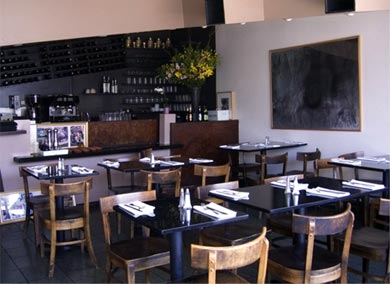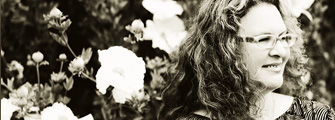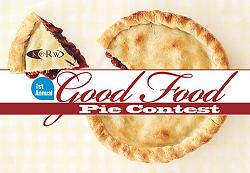Evan Kleiman
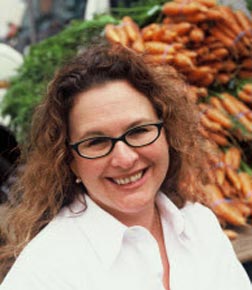 As the only child of a single parent family, Chef Kleiman learned to cook at her mother’s side, until she was preparing meals on her own by the age of nine. Evan later combined cooking and entrepreneurship, selling her own cookies in high school and working as a caterer at college. Still, Evan had decided to pursue a film career and she proceeded with that goal in mind.
As the only child of a single parent family, Chef Kleiman learned to cook at her mother’s side, until she was preparing meals on her own by the age of nine. Evan later combined cooking and entrepreneurship, selling her own cookies in high school and working as a caterer at college. Still, Evan had decided to pursue a film career and she proceeded with that goal in mind.During her course of study in Italian Literature and Film, Evan spent as much time in Italy as her schedule would allow. Parallel to pursuing academic studies, her fascination with the traditional cooking methods and culture of the Italian kitchen led her to the homes and trattorie of Italian women. These travels, which spanned twenty years, provided Evan with the basis for her cooking philosophy.
After graduating Magna cum Laude in her field from UCLA, Evan entered the University’s graduate school for Arts Management and worked a number of film related jobs.
To most young film students these jobs would have been opportunities of a lifetime, but Evan realized that her time spent cooking and catering pleased her most. She quit her job to join Mangia restaurant as night chef and kitchen manager. She worked over 100 hours in her first week and knew that she had finally found her niche. She quickly made a name for herself and was recruited by Verdi Ristorante di Musica in Santa Monica to be its executive chef.
After a year at Verdi, Evan decided to pursue a longtime dream of writing her own cookbook. She contacted Viana LaPlace, a former colleague from her days at Mangia, and set out to find an agent for the newly formed writing duo.
Cucina Fresca, Evan’s first cookbook, was published by Harper & Row in 1983 and launched a new side to Evan’s career. Subsequent best-selling books published by William Morrow include Pasta Fresca, published in 1988 and Cucina Rustica in 1990. Cucina del Mare, her first solo effort published in 1993 was given a rave review in the February 1995 issue of Gourmet Magazine. Angeli: Pizza, Pasta and Panini was released in June 1997 by William Morrow Publishers.
Although busy catering and writing, Evan still felt a desire to do more, and the decision to create an Italian restaurant was a natural one given Evan’s Italian cooking background.
Evan felt there was a need for a “modern family restaurant,” a restaurant that would serve light and simple food that was both stylish and affordable. In December of 1984, she opened Angeli Caffe, a hip Italian restaurant on Melrose Avenue designed to serve “simple rustic food in a modern environment,” according to Evan. Probably no restaurant concept has been so widely copied in LA as the original Angeli Caffe.
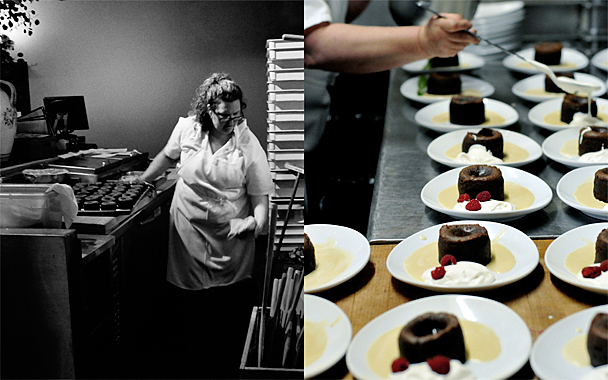 Evan is host of the weekly radio food show “Good Food” which is heard each Saturday morning at 11am on KCRW 89.9fm. KCRW is the second largest NPR station in the country. She was the founder of the original Slow Food chapter in Los Angeles. Evan enjoyed her time on the Board of See-LA the non-profit which runs the Hollywood Farmers Market, but now she is serving on the Stewardship Council of Roots of Change, an organization creating linkages to attain a sustainable food system in California by 2030. In her free time (hah!) Evan continues to write. She also holds special tastings and teaches at the restaurant and at local schools.
Evan is host of the weekly radio food show “Good Food” which is heard each Saturday morning at 11am on KCRW 89.9fm. KCRW is the second largest NPR station in the country. She was the founder of the original Slow Food chapter in Los Angeles. Evan enjoyed her time on the Board of See-LA the non-profit which runs the Hollywood Farmers Market, but now she is serving on the Stewardship Council of Roots of Change, an organization creating linkages to attain a sustainable food system in California by 2030. In her free time (hah!) Evan continues to write. She also holds special tastings and teaches at the restaurant and at local schools.
It's our pleasure to bring you Up Close & Personal with Chef Evan Klieman.
The Interview
As I'm talking with you, I'm heating up some soup for her. She's eighty-nine (89) now and she lives with me. If someone had told me when I was a teenager, carving out my independence that she would one day live with me, I would have said, "Are you out of your mind?" (Laughter) She laughs a lot so that's a good thing. My father died when I was almost eight (8). My parents are originally from Philadelphia and my dad was in the Navy. During World War II when he would come in (to the US) for the ship to be refitted, my mom would fly out to meet him. They decided they wanted to move from the east coast to the west coast after the war, which is what they did. So I grew up in the eastern part of LA and then Silver Lake which is now like the hotbed of hipness. Hotbed of hipness, I like that. When I was growing up is was the hotbed of hipness, but more like Hippie Land. It's sleeker now. I was given a lot more freedom being a latchkey kid at that time than a lot of kids experience these days. Our front door was never locked. I'd often come home from school and one of my mom's friends would be there waiting for dinner. My mom was not a really fantastic cook, but she loved to have people over and she loved to share food. She was an entertainer? Yes, an entertainer and a hostess. What's your fondest mother/daughter food memory? Oh my gosh! I just think that my whole childhood, especially preteen through high school, since I was about 10 until I was 16, we just did all the cooking together. There was never a fight, she just expected me to help. She needed help. I was never a princess in the kitchen and I think that was the greatest gift she could have ever given me. When I see children now, and how their parents do everything for them, I believe they are handicapping them of this skill that can be learned so easily and organically when you are a kid. Even though she wasn't a gourmet cook she taught me all the basic things; how to pick produce from the produce section and what to ask the butcher. On the weekends we'd spend a good part of Saturday or Sunday shopping and then cooking for the week. She wouldn't have to worry what would be put on the table during the week. We'd make a pot of spaghetti sauce and broiled teriyaki chicken. What I find fascinating taking into consideration your cultural background that your family/mom would have taught you about Italian food. It was American food she was teaching me back then. It wasn't like she was teaching me how to make a long braising ragout. You know what I mean. We made American spaghetti sauce, but she made it from scratch. I grew up the same way. I'm half Italian but my dad is the Italian one. My mom reached out to my grandmother for how to make certain Italian things. Everything was, and still is, from scratch. It was kind of unusual at that time, it was the 50s, and everybody was in love with the new things. She would let me have TV dinners every once in awhile. We had things that you could make a lot for a little bit of money were interspersed with pork chops or lamb chops. She would order from the butcher shop, which was close to my junior high school, and I would pick it up on my way home from school. The butcher would write on the paper what I was supposed to do with it, like a roast. Perfect segue to my next question whether your mother was the only person who influenced your perception of food as a child. We had cousins who lived in LA that we were really close to and my aunt (who was really my cousin but I called her my aunt). I was really influenced by her. She didn't buy gourmet or use The Joy of Cooking, she would occasionally clip recipes out of the LA Times. It was just plain, simple food. That is what was going on in food in America at that time. Yeah, but the thing about me though, was that I graduated from high school very young, I was 16. I didn't go to college right away, I went to Europe instead. I think what my mom did was make me at ease in the kitchen. I wasn't intimidated. You developed a 'comfortableness' with the kitchen. Total comfort. When I was still in school I brought home the gourmet cookbooks. I brought home The Joy of Cooking and Julia Child. She didn't cook that way and never made desserts. I wanted to learn. What prompted your zeal to learn? You weren't exposed by your mom or aunt, so how did you become aware that those types of resources existed? I was an egghead! (Laughing) To me, a favorite thing to do on the weekend was to go to a bookstore. In Hollywood at that time there were a couple of amazing, enormous book stores. I was always drawn to the cooking section. Now that I'm thinking about it, we did have a neighbor, during that 10-16 year old time in my life, who was from Boston. She lived behind our house and she taught me how to bake a few things. She'd bring over her cookbooks and answer questions. I guess she must have taught me the proper way to measure things. I assume you took Home Economics, because that's what it was referred to back then. Yes, but I took sewing because I already knew how to cook. Only in California would they let you choose. Here on the east coast we had to take everything (Laughter). As I'm listening to you share about all the people that really impacted your perception of food and cooking, it mirrors the "It takes a village to raise a child" mentality. Yeah, kind of. Because I was a latchkey kid, and before I was old enough to be home alone, I was constantly at somebody else's house after school. The neighborhood I grew up in was a sort of We Are the World, U.N. neighborhood. I think I was always interested in cooking and the women who did the cooking. Maybe because I didn't have a grandma or a lot of aunts. If I was at my friend's house whose mom was Serba-Croation and she was making pizza, I was fascinated and wanted to watch her make it. I became a culinary zealot. It (your neighborhood) allowed you to experience numerous food cultures, unlike someone perhaps growing up in Brooklyn. That's true. I learned about a lot of different cultures young and then I would follow up by reading about it/them. When my mom gave me a subscription to the Time Life® Cookbooks I made everything in the book when it arrived. (Laughing) What was your first job in the food industry? I worked for a caterer. It was how I put myself through undergraduate school. She, Shelia Mack, catered to Hollywood celebrities. I worked for her for 4 or 5 years, until I graduated college. She was a cookbook driven cook. She'd post a menu on the fridge and we worked through it. If we had any questions we would just ask. The recipes were from gourmet books that pre-dated the Julia Child book. At that time when you went to the grocery store there was only one type of parsley. There weren't thousands of options like we have today. In retrospect, what was created with limited ingredients that were available is amazing. It was an adventure. I remember going to the Greek ethnic market in LA, Pap Cristos C&K Importing, which is still there, it was an adventure. You'd walk in and ask about these ingredients that you read about in a cookbook. It was a whole exchange, you'd learn a lot. The suppliers who handled the products became an instructor for you as well. They had to know about their products. Absolutely! What did you study in school? Italian literature and film I understand that you did some work in the film industry? Yes, not a lot. I worked in that industry, in development, for maybe a year. I was still catering, but on my own. I realized after I came home from work one night that I really needed to make a decision. You were at a crossroads. When people think of film, they think of someone either 'in front of' or 'behind the camera.' You gave up being behind the camera for being behind the stove. Yeah, in production (in the restaurant business being in the kitchen is called production too) there are a lot of similar things. There are a lot of difficult tasks; the hours are hard, you have to please people that can be extremely difficult to please, etc. We speak with chefs from all walks, average to high profile. They all say the same thing, that to be in a relationship you have to have a very special person, who understands what the industry is really like. The food industry is not a walk in the park. It's not all the glamour that sadly a lot of young people who want to pursue a career in food think it is. Which I don't understand, how can they think that? The minute you go for your internship you learn right away what it is. Brutal! If you're lucky you click. I ended up going back to school and getting an MBA, still thinking I was going to produce movies. At that point, I walked into a restaurant (Mangia) that I considered was doing real Tuscan food. I had spent a lot of time in Italy for my undergraduate degree and knew real Tuscan food. I told her (the owner) that I could do it better than anyone she had at that time in her kitchen. I told her I'd work for her for a week for free. I told her I'd never worked in a restaurant, but had catered for years. I worked for her for free, got a job and within six weeks she fired the executive chef and I was running the kitchen. When kids tell me they want to go to school, I say if your parents are going to pay $30,000 a year for you to go to school and you know you want to cook, yeah, go to school. If you’ve already been to school, and you just want to cook, then go to a restaurant. That is one of the biggest discussions that arise when speaking to chefs, to go to school or not. Those that have had a culinary education give mixed responses, some saying they’d rather have taken the money and done stages around the country or the world. I also believe that it is a personal preference. How much time elapsed between when you began your ‘official’ restaurant career and you decided to write your first cookbook?
Did your drive for Italian food stem from your love of Italian literature? When I started studying the language I was also going to the country. If you start traveling in Italy when you are 16/17 years old, by the time you are 21 you are already connected. I had friends and spent summers there going to language schools. You became Italian! It became my adopted culture. A lot of the interaction I had there was about food. When I left home I was a pretty shy girl and I think that is one reason why I cooked as a kid. It was a whole lot easier for me to cook and serve people than to sit at the table. It’s more than just food. People that are serious about all things culinary get that. You’ve spoken with people about design and how that plays a part in food. I’ve always viewed people that create cuisine as an architect and their foundation is a plate. I’m an educated person and it frustrates me when someone says, "Why should I get a BA?" It’s true that it may not make you fit for a job necessarily but it teaches you how to think and the value of the written word. Then you are let loose in the world. I was much happier staying home to watch the grandmother making ravioli then going out to a club. You were impacted the most by participating in the every day culture. Yes, that was it. I learned there (Italy) that the chickens we got in America were different than the chickens they had there. I remember the very first apartment I ever had I shared with another American student and we had a hot plate. I went to the butcher and got a chicken and on the way home I’m thinking, "This chicken is awfully heavy." (She is laughing so hard) When I got to the apartment I had to look into the hole (the cavity) and discovered, "There is no hole." You had to do it. I had to make the hole! Oh my God, what an introduction to chicken plucking. I didn’t have to pluck it, but I did have to eviscerate it (we are both laughing hysterically). My roommate thought it was horrifying and I thought it was fascinating. Let me jump back to the cookbook for a moment. Not many people would have tackled writing a cookbook after being in the business for only a year. That took guts. I already had 10 years of travel and cooking what I ate in Italy. Ten years of absorbing, coming home and making the dishes, going back to Italy and cooking with my friends there. I just felt self-confident. You had to be. I didn’t think of myself as being self-confident back then, but I knew that I knew about this. That was Cucina Fresca. You had the vision and you went forward with it. There are a lot of people who have admiration for the level of confidence you had in yourself to do that, whether you recognized that or not about yourself. There were no computers and I wrote that book on a typewriter with carbon paper. You’ve written 6 cookbooks to date. Does it get any easier? I think I’m good at writing recipes, it’s sort of rote now. For me it’s communicating. I’m working on a book proposal now. There’s so much I want to say. You know as you get older you have a lot to say. (Laughing) I view it as we have turned the corner and we become this sage and everyone wants to know what our wisdom is. For me, it’s less about sharing my wisdom than sharing the fact that even someone with a certain amount of mastery still has something to learn. I take people along my journey with me. You have more to say than just 2 cups of flour and a pinch of salt. You bring the culture through your cookbooks. Certainly the fact that I love my restaurant, Angeli Caffee, it’s like my family, but what really turns me on and what I’m raring to do every morning that I go there, is my radio show. It’s because it totally feeds that geek in me. I’m still an academic that loves to learn things. I sense that it is more than just that you love to learn new things. You are more of an educator. That’s the flip side of learning things. In the course of doing the show, I’ve been on 12 years and have done over 5000 interviews on every aspect of food. From the sublime, like interviewing Thomas Keller and Heston Blumenthal, to the ridiculous like interviewing competitive eaters. For me, my interest in food has always been cultural and through the radio show I get to explore. What place does eating and the food culture have in the human game, the Circus of Life? That thrills me and is endlessly fascinating. That is the essence of who I am and the impetus for creating Gourmet Girl Magazine. As you know my mother is from Aruba and my father is first generation Italian. Wow, what a combo! Yeah, and like you, I too am an only child. We also share a similar drive and passion. When interviewing, someone like Marcus Samuelsson for example, my desire is to tangibly bring forth what drives his culinary genius. His inspirations and in turn share that with our readers. Experiencing what the chef creates after the interview allows us to have a greater appreciation for their art and understand better what went into creating those dishes. After speaking with you, and then tasting the manifestation of who you are through the plate, is a phenomenal experience that excites me (and Louis) and we can’t wait to share that. Tapping into what inspires you, getting my finger on the pulse of emotion of food, changes my perspective and interpretation of what you prepare. Gourmet Girl Magazine is the conduit for us to share that experience with others. It is very personal. We’ve connected on an emotional level, having laughed or cried during our conversation. We share the same passion. It’s wonderful really. I feel blessed being able to do what I do. It’s a privilege to me. Louis teases me all the time because when we sit down with a chef, I get so excited. He often tells me I get giddy (we are both laughing at this). He says I have 'chef of the week' syndrome. I am more excited about having the opportunity to speak with someone like Thomas Keller or Daniel Boulud, than speaking with Tom Cruise (Okay, Cary Grant is a different matter entirely). (She’s laughing) Oh, absolutely, it’s more interesting. Even learning what prompts them to pick one tomato over another, that to me is interesting. You really have to be a person whose whole essence is about food to relate to that. Absolutely! I worked in education, which is another connection for you and I. To me cookbooks are valuable education tools. They are more than just about ingredients and preparation, introducing the user to the culture, particularly if the ‘cuisine’ is not their first language. I agree with that. When you watch Top Chef, or other types of culinary competitions, and chefs are asked about cookbooks, often they pooh-pooh them. They are driven by technique and they are highly trained. All they need to do is be let loose in their own creativity. For me when I think about Naomi Dogood and Jeffrey Alfred or Paula Wolfert, these are people that have been like a grandmother to me. They have not only taught me how to make a dish, but they’ve taught me how to make a dish in context. Those are the books that make me the most excited, I learn a whole host of things that have nothing to do with food. You learn the things that make the food what it is. Exactly. You made a comment about primary and secondary learning institutions and their attitude towards occupations that are ‘hands-on,’ almost as if second class citizens. I agree with you in that there is this sort of ‘hands-off’ getting dirty mentality. When I was going to school, the kids who took classes like shop were thought of as, "Oh, those are the blue collar kids." If any one of us had been a mechanic then, we’d be well off today. My mother was always a big ‘craft chick.' A lot of the things we did together were things like knitting, working with clay and making candles. It was that whole thing where we had this appreciation for making things. Until this generation, American kids in their 20s and early 30s have such a reverence for handwork and craft. Like what’s going on in Brooklyn right now. You see this hotbed of DIY culture being applied to food. It’s going to be really interesting to see what those kids grow up into and what kind of creating they do down the line. You really do feel that the mindset is changing with the general populace, but do you think it has or is changing in the educational system? No, I know my high school that I graduated from has C-CAP there, where kids have an opportunity to earn unbelievable scholarships to the finest culinary institutions. Due to the financial situation of the state of California right now, money for those programs has been pulled. You look at some of these kids and for them; the best thing that could happen to them is to go into a culinary field. It teaches you discipline, math skills and teamwork. Everything they’re learning are things you want a well-rounded person who is contributing to society to know. Who cares if they are using their hands to learn those things or if they are doing advanced algebra? A lot of those traits are similar to those garnered in military service. You learn a trade and for the rest of your life you’ll never go hungry. You’ll always be able to find a job. It has an incredible amount of self expression. There are people in the world that learning with their hands is their way in, like dyslexic kids. Why does everybody in the world have to sit at a desk? How boring? | Do you think that the Slow Food Movement has affected people’s attitude about food? I think the Slow Food Movement gives permission to Americans to enjoy their food. That’s Step One. No matter where we come from, no matter what country, the overall society still has this puritanical streak. The whole obsession with dieting, eating this food is bad and eating that food is good. That mentality makes it really hard to appreciate your food if you are so fraught with sitting down at the table, that all you’re thinking about is calories. Even today when I go to Italy and visit my friends, everybody has a connection with the countryside. You go into peoples’ homes and everybody has some weird bottle of olive oil, or a piece of pancetta or cured meat that they brought in from the countryside or from a neighbor. No matter how urban they are, they still understand where food comes from. I think what Slow Food did was really educate people. The Farmer’s Market Movement really benefitted from the Slow Food Movement. I think they fed into each other. You have to know where your food came from and it’s really helpful to know who grew it. It’s wonderful having that connection. Let’s talk a little about Angeli Caffee. Would you say that your trip to Salone di Gusto was pivotal in molding your perception of food art? No. I think I was already pretty clued into that from my previous exposure 20 years before. It’s now more than 30 years that I’ve been going back and forth to Italy. When I went I was already clued into the culinary culture. I think what Slow Food did for me was that I was really burnt out as a restaurant owner/chef. I think meeting so many food artisans, the people who make the food, completely woke me up. I didn’t shop at farmers’ markets before I went there. I said to myself, "You’re an idiot." (Laughing) You had an epiphany. I wasn’t plugged in at home like I was in Italy. I wanted to get connected. There’s a polenta guy making stone ground polenta in northern Italy. I knew there was a stone ground guy making grits and corn in the south in America. I wanted to find them. I wanted to get to know California cheese makers. It woke me up to how beautiful the relationship with artisan makers was. It also woke me up to the fact that I could bring that connection to Los Angeles by opening a Slow Food Chapter.
Not on a daily basis (Laughing). When I originally wanted to open Angeli, I only knew one architect, who was a friend. I knew he was extremely modern and told him what I had in mind was a chapel. The oven would be the altar and we would have niches along the sides of the wall with candles. They loved it and completely bought into it. They created this extremely refracted view of that for me. People waited in line for a long time to get into your restaurant. It was the weirdest thing ever. When we first opened we were half the size we are now. We had 24 seats and served only pizza, salads, antipasti and sandwiches, no pasta. I don’t know, all it was, was really simple Italian Tratorria food. I think it's because it was served in this really edgy, then, architectural environment. It’s so weird; we were the first people to have slate on the floor. People came for the décor first, and then you surprised them with what you brought out on the plate. People waited 2 hours for a sandwich. We were never empty. We were deluged and copied by everybody. We have said repeatedly that 'you can’t eat the décor,' yet in your case the décor drew them in and then you wowed them with simple great fare. We had this What’s amazing about Angeli today is that architecture students come as part of their architecture class. It still completely holds up. Then, in 1984/5, it was a ragingly hip place to come for young boomers. Now they have children and grandchildren. All these children are eating there, making their own little breads, giving it to us and we put it in the oven. It’s become like Cheers. It’s everybodys, it’s a huge first date place. It’s very comfortable, easy, non-judgmental place to be. You have a modern feel that is not sterile. The people complete it. I like that. Speaking of people, has your relationship with the farmers changed you or Angeli in anyway? It makes you more appreciative of the ingredients, you don’t want to waste any. You know the person who is putting their sweat and blood into it. Everything is so delicious. Doing the kind of food that I do, it is completely ingredient driven. If you don’t have really good ingredients, you might as well pack it in. I feel like they make my work effortless. Tell me about Evan’s Tomatoes. That was a funny story. Salone di Gusto happens every other year. On the off year there is a festival called Cheese. Cheese is a festival that goes on in the hometown of Slow Food called Bra. Literally it is a 3-4 day festival where the historic center of the city is just lined with cheese mongers. I went one year with my Mom and good friend Renee, and I saw in a produce shop, in the window, the ugliest tomatoes I’d ever seen in my life, sitting like Pride of Place in this basket like jewelry. I said I had to go in and try it because there has to be a reason they put this ugly tomato on display. I went in and bought a bag of them and came out, pulling one out and bit into it in the street. It was the most amazing tomato! It was perfect for cooking. It was meaty with very small seed cavities. It was delicious, but it wasn’t just sweet. I went back into the store and asked what the variety was and wrote it down. This was in a little town in northern Italy, outside of Turin. For the rest of the trip, every town we went to I went into the hardware store, which is where seeds are, and looked for these seeds. I finally found them in a store in Lucca. I bought every seed packet they had. (Laughing) When I got back home I handed them out to a few farmers that I trusted. Many planted them, but one in particular had everything that came together for them, the right soil, microclimate, etc. They had a small crop the first year and sold them out immediately. There are many farmers growing similar varieties, but this farmer has those exact ones. It’s the perfect tomato to roast and/or puree. It’s wonderful. Most of the farmer’s that we love, the Top 20 so to speak, that we chefs patronize, are people who are intensely curious. They travel the world looking for seeds, they read about seeds. It’s not like they are only interested in looking through the Burpee catalog. One guy specializes in growing greens from all over the world, which is perfect for southern California because he has customers. When you watch his stand, he has customers of every ethnic group from around the world that come to him because it is the only place they can get a particular type of green that they miss. It’s a word of mouth business. Exactly the opposite when you don’t know who grows the food you eat. How do you think the film Food Inc has impacted the public? I just think that people are ready to hear more. I think they were ready for this next step in getting more educated about their food. I hope that the people, who see Food Inc, aren’t the people that already know everything in the movie. How about Nose to Tail? There are a lot of chefs for whom using the whole animal is the next step after buying fruits and vegetables at the market. You get to know the farmers and maybe they are raising a few pigs and you ask, "Can I get some meat from this pig?" It’s sort of like drugs. This is the Gateway (farm name) Drug. Michele (Nischan) could tell me how many cows they went through, not the number of pounds of beef. We are very challenged on the west coast, in the southern part of the state, because there are so few independent slaughter houses. A rancher is not allowed to sell meat commercially unless it’s butchered in a USDA slaughterhouse. Buying beef is a challenge if you want to know who the farmer is. Chefs are more uniquely able to use the whole animal than people at home who don’t have a refrigerator for 1400 pounds of meat. When I lived in Vermont we raised our own beef twice. It is an extremely educational experience. We had two freezers, one specifically for the beef. More and more people are doing it. Ford’s Filling Station is doing it. With a six week lead time you can order an entire pig for 8-10 people. You can confer with him in advance and tell him what you want to be made out of it and he’ll use the entire animal and give you an incredible meal. What a great idea. It provides the diner with an amazing first hand experience on what it truly means to eat from Nose to Tail.
Let’s come back to your radio show, Good Food on NPR’s KCRW. I wasn’t the originator of the show. The host was the 'Two Hot Tamales' and I was an occasional guest. I would do garden to table segments, Jewish holiday cooking segments. When another commitment forced them to give up the show, the producer asked me if I would be interested. I said, "Oh, yes!" It was the scariest thing I ever did and it took me a really long time to feel comfortable. It involves a whole other skill set. It does, as I’ve learned from being a guest co-host on a dining show in Tampa. Now it’s my favorite thing. I just love it. I’m an employee; I don’t have to do anything except my job (Laughing) I’m a total egghead. When I get handed 10 books, I’m like, Oh Goodie! Tells us about your show. Good Food looks at the human race through food. It is not a show about dining and it is not a show about recipes. It takes a much more anthropological, sociological entertainment look. Every show begins with the market report, done by Laura Avery, Manager of the Santa Monica Farmer’s Market (one of the most famous markets in America). It has its own flavor and sets up the show. It’s your taste of what’s fresh that week. It’s your platform and you build from there. Yeah, then we may talk to a couple of crazy designer guys in London who are working on an inhalable cocktail. You walk into a room and just breathe and you’re drinking a gin and tonic. They are now working on an architectural punch bowl you can ride a boat across. I’ll talk to people who mix design and drinking and eating. Then maybe I’ll talk to a female hunter in Alaska who hunts caribou. Then I’ll talk to Thomas Keller. He is amazing isn’t he? In the same week I got to talk to Thomas Keller and Heston Blumenthal. When I was handed the Fat Duck Cookbook and started to read it, it was interesting to read how he fell in love with cooking. It was exactly what happened to me and he ended up in a different place. All the sciences, he was fascinating, I could talk to him forever. Then I might interview a pastry chef or the woman from NASA who is in charge of making sure the food is edible on the trip to Mars. It’s extremely eclectic and I have a lot of male listeners. People say to me that they don’t cook very much but they enjoy the show. The other thing about the show is the station, it is a unique station, even for NPR, we have so much music. It draws an interesting community of people that I get to have this virtual world of people that I get to talk to on my blog. Occasionally we get together in an ‘actual’ world and you see the community that’s out there. That’s the other thing that is really gratifying. I feel I have this place in the community of Los Angeles that I can bring people together from the community around food and important issues about food. Have you ever had a guest that was difficult to get them to converse with you? Yes What did you do? It was a person that wrote a Swedish Cookbook. It was one word answers. The thing that is so funny is that I have two producers that are Swedish and they were in the control booth laughing hysterically when I’d be getting these one word answers. I’d be like, "Don’t these people know we’re here for them?" Every once in a while you’ll find a chef who isn’t the most articulate person in the world. That’s more common then people think. Not every chef is a Food Network personality. Thank goodness for the ability to edit, that’s all I can say. I’m excited because you’ve read material about someone, a book. That’s what we (you and I) do. If I were to see you tomorrow I wouldn’t hesitate to give you a hug. Exactly! It’s wonderful. I remember interviewing a woman about hunger. It wasn’t how do we feed all the hungry people. It was about hunger from a philosophical standpoint and I could have talked to her for 3 hours and we get to cut it down to 8 minutes. Don’t you find that you get spellbound? I do. When I first started I would write down every question and when the conversation started to veer off, I’d get panicky and wanted to bring people back to the question. Now I write down one question, have done all my prep, I’m along for a journey. The ability to laugh and be comfortable is the number one priority for me. I think you see that we do have a passion for food. Talking with someone like you who has the same passion sets the tone for me. Speaking with people from around the globe is probably one of the most rewarding things for me. So exciting isn’t it? Thank you, yes. Because we’re public radio we have to beg for money a couple of times a year. Once while we were in the midst of our campaign, we get this note from one of the volunteers who’s on the phone that we just got a pledge, in real time, from Bagdad and they weren’t in the military. We found the email address of this couple and contacted them. She’s been on the show as a foodie in a war zone. They are in Kabul and we are friends now. So, tell us the real story about the pies. When you grow up in southern California and you’re a kid, you think that there’s never ever a summer where you don’t spend a good portions of it at the beach. Then you grow up and you watch these summers go by and you realize that you’ve never gone in the ocean.
It was the beginning of summer and I didn’t want this summer to go by for me without doing something different. I’m not a kid, don’t have kids, and it’s not like we’re going to go on a family vacation and I’m not going to experience summer vacation vicariously through my children, so what can I do? I love pie. As soon as summer comes all the stone fruit comes and I’m always making pie anyway. I thought, "What if I make a pie a day? What would happen?" I mentioned it to my producer and asked if I could talk about it on my blog? I thought if I had a public place to talk about it, it would make me do it. That’s how it started. It was sort of this process about discovering my inner grandmother. It started out with me just putting the pies out there, and then we added the Eat a Pie a Day section, which asked listeners to come onto the blog and post their stories about pies. It just spiraled and became this amazing community of pie makers. The climax was when we had the first pie contest. We had 150 people sign up and 125 of them showed up and brought their pies. There were about 400 people that came. It is not the first thing you think about when you think of Los Angeles. To be the person in the center that brought all these people together….unbelievable feeling. I was so proud of my city. People came from everywhere. Says a lot about you. Said a lot about them. People practiced, some wore aprons worn by their grandmothers. It was very touching and exciting. Your event personified the emotional connection that people have with food and what they are willing to do to share that with other people. You joked about home cooks penchant for not sharing their crust recipes. I always believed, and still do, that a true lover of food is willing to share their secrets. Bottom line is that it really is about the food. Don’t you agree? It’s very cultural. I think for some people, it’s like giving away part of their family. I’ve published everything I’ve ever made. It’s also what makes pie so interesting; pie crust is basically pie crust. You look at 100 recipes and they are all tweaked in some tiny little way. The winning pie: I had never seen so many crust ingredients! Reflecting on your life to this point, do you have any regrets? Not a one, I’ve been in therapy a long time (Uproarious laughter). What do you see on the horizon for yourself? I really want to try and carve out time to write. I would like to be able to have an impact on the conversation about food in this country. I think that my ease can go a long way to making difficult subjects more palatable. That’s a lofty goal. I’d like to be the Oprah Winfrey of food. I would like to be a part of talking about the food agenda in this country. It would be nice to bring the conversation to people who don’t think about those things very much. It’s about making food accessible. I think a lot of people feel beat up. A lot of people, who have no choice, or very little choice about what they eat, don’t even have that in their head. They are just trying to survive. The time, energy and commitment of your colleagues, like Alice Waters, and Michel Nischan who work tirelessly for changes in legislation and curriculum, to bring awareness is staggering. People that are outside the loop about what is happening in the world of food it can be overwhelming. The messages often come off as elitist. I’m not an elitist kind of person. I will admit to having eaten a Filet O’ Fish. (Laughing) That’s why I’m excited about the work I do with Roots of Change to change the food system in California which is done behind the scenes, providing forums for people who need to talk to each other that normally wouldn’t. You could say that you are acting as a food mediator. Yeah. I’m lucky to sit in a room with people like the guy who knows more about water issues than anybody, somebody from the EPA, incredible women who ran parts of Obama’s campaign. I’m really lucky. Is there one thing about yourself that would surprise people who know you? I don’t consider myself a foodie. That word to me has come to have baggage. I think of myself much more as a food geek. Every single meal I have isn’t some fabulously considered meal. I’m hungry as I’m talking to you and I’m eating peanut butter out of the jar. (Laughing) All natural I’m sure. Not as 'granola head 'as it should be. (Laughing) It’s like my mother’s shopping list, root beer and ice cream are at the top of shopping list. I don’t consider myself a food snob. I don’t drink wine, it doesn’t agree with me. I drink spirits and beer, but don’t drink wine. This means when I attend one of those 20 course events, where wine is served with every course, I just want to leave. I want to stick needles in my eyes. I’d prefer to be in a room with four really, really good friends. |



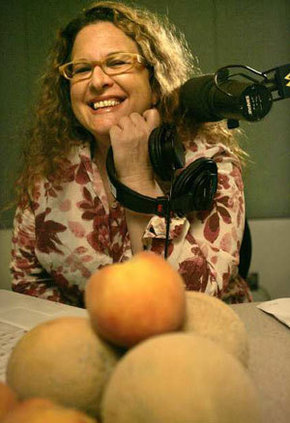 Let's take a few moments and talk about your childhood. You are an only child that grew up in a single parent family, which can have a unique set of challenges. Tell us a little bit about your relationship with your mother, aside from food.
Let's take a few moments and talk about your childhood. You are an only child that grew up in a single parent family, which can have a unique set of challenges. Tell us a little bit about your relationship with your mother, aside from food. 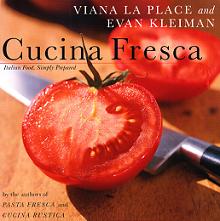 Almost immediately. When I was at Mangia, I met Viana and while working as a prep cook we talked a lot discovering that we came from a similar place and knowledge of Italian food. At that time there had never been a book done on antipasti like I thought there should be. We put together a mock book, even paying for a photo shoot. I modeled it after this sushi book I had seen that had one beautiful picture on each page. I found an agent who represented literary people, whhich was hard in LA, and I brow beat her (Laughing) for an hour with my book proposal.
Almost immediately. When I was at Mangia, I met Viana and while working as a prep cook we talked a lot discovering that we came from a similar place and knowledge of Italian food. At that time there had never been a book done on antipasti like I thought there should be. We put together a mock book, even paying for a photo shoot. I modeled it after this sushi book I had seen that had one beautiful picture on each page. I found an agent who represented literary people, whhich was hard in LA, and I brow beat her (Laughing) for an hour with my book proposal.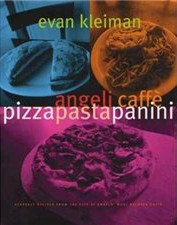 In reading about your restaurant I discovered that you referred to your pizza oven as The Altar.
In reading about your restaurant I discovered that you referred to your pizza oven as The Altar. 